The owner of a social housing development built in breach of a restrictive covenant, which faces having to tear it down, has asked the Supreme Court to come to its rescue.
Housing Solutions has asked the country’s highest court to overturn a 2018 Court of Appeal decision refusing to allow modification of a set of restrictive covenants – a ruling which could leave it having to demolish the development.
The Supreme Court has reserved judgment in the case, in which the central issue is the correct approach to the “public interest” requirement on an application for the modification or discharge of restrictive covenants under section 84 of the Law of Property Act 1925.
Developer and Housing Solutions’ predecessor in title, Millgate Developments, finished building 22 homes on land adjoining a children’s hospice near Maidenhead, Berkshire, in 2015, despite a restrictive covenant dating from the 1970s which expressly prohibited development.
It then applied for the modification or discharge of the restrictive covenants, which was resisted by the hospice owner, the Alexander Devine Children’s Cancer Trust.
The Upper Tribunal (Lands Chamber) ruled in the developer’s favour that the covenants could be overridden because they were against the public interest, in impeding “the continued existence” of much-needed social housing.
However, the Court of Appeal reversed the decision following a legal challenge from the trust. It found that, having been presented with a “fait accompli”, the UT had misapplied the public interest test.
Now Housing Solutions is asking the Supreme Court to allow its appeal and effectively reinstate the UT’s decision.
The charity was able to invoke the covenants on the developer’s land because it holds land that touches the plot, and is therefore directly affected. If the ruling is upheld, it could potentially seek a court order forcing the developer to tear down the buildings.
Paul Greatholder, partner at Russell-Cooke, who is advising Alexander Devine Children’s Cancer Trust in the proceedings, said that the court is faced with two important issues: “the public interest versus private interest, and the importance of seeking to assert legal rights in a ‘moral’ fashion”.
He said: “Firstly, it is being asked, for the first time, to weigh up the relative importance of two sorts of planning law. On the one hand there is the local authority planning permission process that most people are familiar with when buildings are built, altered or demolished. A local authority makes decisions about what is in the public good and what the general development rules are. However, there is also a widely used system of private planning law for land using restrictive covenants, where one landowner can manage how a neighbouring landowner uses its property, creating a type of long-running private property contract. The Supreme Court will need to assess what happens when the two systems conflict.
“In the case of Alexander Devine Children’s Cancer Trust it benefits from a private restrictive covenant which says that neighbouring land cannot be built on. The neighbouring developer has ignored that restriction and has tried to remove AD’s rights on the basis that the developer’s planning permission for a housing scheme trumps the restrictive covenant.
“The second ‘moral’ question is as important. There are very legal limited circumstances in which a restrictive covenant can be removed. The developer in this case built its estate on the restricted land first, and only then tried to arrange for the removal of the covenant by taking the trust to a property tribunal. The Court of Appeal regarded this as an attempt to present the relevant tribunal with a fait accompli, and gave very strong guidance that this sort of behaviour should be discouraged so as not to promote a situation where a developer (or anyone else) could profit from their own legal wrongs.
“The trust depends on its assets to be able to deliver its mission of running a children’s hospice. The legal rights the trust has over the neighbouring land are things of value to the trust, and this case is about the trust protecting the value of those assets.”
To send feedback, e-mail jess.harrold@egi.co.uk or tweet @estatesgazette








